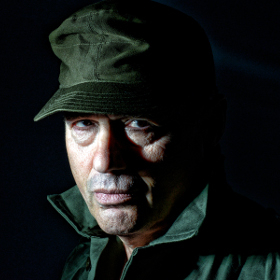Guest blog: Paul Herzberg on The Dead Wait

I left South Africa in 1976 after returning from the Angolan border as a conscripted soldier. The country was caught in volatile times: Black Consciousness had exploded in the townships, the Portuguese had fled Angola and Soweto was in flames.
The war in which I had been involved, set to continue for another 13 years, was like no other in that it was almost entirely secret. Soldiers were forced to pledge their silence. The apartheid authorities were determined that word did not get out as to what was going on beyond the Namibian border. It is a silence many have maintained – aspects of that war were so harrowing that ex-soldiers on both sides still suffer from post-traumatic-stress-disorder today. It was South Africa’s Vietnam.
Long after I left I began a conversation with a man on a British train. He told me of an incident involving his nephew as a young soldier in the border war. While on an Angolan mission his unit had captured a wounded black freedom fighter. The unit commander had it in for the soldier and suspecting their captive might be important, ordered the soldier to carry him on his back until they reached the border for interrogation.
The freedom fighter whispered into the soldier’s ear as they moved through the bush and in the mayhem a bond began to grow. The commander responded to their unlikely friendship with catastrophic results.
This image, ally and foe locked together, haunted me. Using my long absence from the country I found a way to build a play round that anecdote, to connect it to contemporary South Africa. The notion of these two older men – an iron-willed Afrikaans officer and a black freedom fighter doing battle for the soul of this callow white kid – while around them a war is raging, was simply too tantalising to ignore. In the second part of the play, haunted by events in the bush, the soldier, now in middle-age, returns to South Africa to hunt down his former commander in the pursuit of justice – but he finds dramatic changes in the country, and in his commander.
The play has taken me on a long journey. Following its production at the Market and successful run at the Royal Exchange, I redrafted the script. The response of audiences clarified something important – that the play had a timeless appeal, which meant I could strip away almost all references to specific historic events. In this latest draft for the wonderful new Park Theatre, I feel I have reached a stage with the script that straddles present and past with equal force.
I have shifted the setting to the late 80s and present day South Africa, post Truth Commission, with all the growing pains of a fledgling democracy – a final draft of the published play.
The border war officially ended in 1989 just before Mandela’s release and shift towards democracy – a pivotal year. This intensified matters on many fronts – in the bush – and in the hearts and minds of all South Africans.
I revisited Rundu on the border where I had been stationed three decades earlier in 2010, spending an extraordinary week retracing my military past. As I finally left I passed the gate to my former camp with its daunting South African army logo emblazoned across the arch.
I turned back for one final look: and that lurking image offered itself to me beneath the gate – the young white soldier carrying the black insurgent, with whom, despite being trapped in that terrible war, he had formed such an unlikely friendship.










